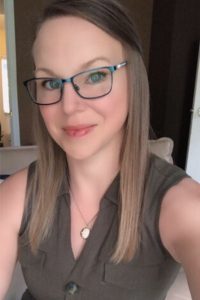Dr. Kelly Doyle earned an Interdisciplinary PhD from UBCO in 2015. She is a member of the International Gothic Association, the Popular Culture Association of the South, and The Society for Cinema and Media Studies. A faculty member in Kwantlen Polytechnic University (KPU)’s English department, she teaches horror fiction and film, critical theory, and university writing, and she chairs the search committee. She is an advisory board member, reviewer, author, and lead copyeditor for KPU’s official film studies publication, Mise-en-scène: The Journal of Film & Visual Narration. In her spare time, she can be found weightlifting, practicing calisthenics, or watching horror films!
We met up with Kelly to talk to her about her time here at UBC Okanagan and what she is doing now.
Tell us a bit about your dissertation.
Shortly after 9/11, there was a zombie renaissance in film and I became interested in understanding why. Using posthuman philosophy I explored how the figure of the zombie in horror films from 2001 to 2012 exposes and challenges the discursive formulation of what it means to be human in the context of historical events like 9/11: who can be othered, and to what end. I argued that exploring the limits of the human prompts a consideration of the human capacity for ethics and social justice since if boundaries do not hold between races, sexes, and species, it becomes impossible to justify sexism, speciesism, and racism in the world outside the screen. In films from 28 Days Later to Resident Evil to World War Z, there are mediations on American Exceptionalism, 9/11, genocide, and other touchstone societal anxieties that deserve close critical scrutiny.
Tell us about the road to earning your UBC degree and some highlights of your time here.
I chose to come because of Jodey Castricano. There was simply nobody else I wanted to work with who I felt could help me do my project justice. Tempering expectations living in a smaller place was difficult at first, but I wouldn’t trade the experience. I overcame challenges by seeking support from my supervisor and my new grad school friends. Nobody has the mental fortitude to get through grad studies alone! Highlights would be the long hours with friends in the grad student office, alternating serious work with serious silliness. Organizing the graduate student conference. The day I won a teaching award, and the day I successfully defended my dissertation with the support of my committee. FCCS faculty and friends in the defense room and outside of it. Social events with classmates and professors, and interesting but challenging classes.
Is there a professor that stands out as someone who made a difference and helped you along the way?
My supervisor, Dr. Castricano was pivotal to my success. They believed in my project from the first email I sent and modelled professionalism, confidence, and success. Working with Dr. Stouck was also key to getting me where I am today. I would be remiss if I didn’t mention Dr. Grinnell, as well as Dr. Francisco Pena. Dr. Daniel Keyes helped me to refine my approach to film and forwarded me conferences and calls for papers that might be of interest.
It’s been seven years since you completed your dissertation, what are you doing now and what are your future plans?
As a faculty member in KPU, I’ve developed four courses that center around horror film, fiction, and transmedia, with another upper-level course on horror film in development. I am also working with the Vancouver Horror Show Film Festival as a guest judge for their Table Read series, a horror film script competition. One of my film studies assignments offers the option to make a short horror film to the VHS. In the future, I have some exciting ideas for collaboration with other institutions and departments at KPU, field trips for film students, more publishing, research, and conferences in my areas of interest, and a revising of my film course on the evolution of the zombie in horror film.
Lastly, what advice would you have for a student who is contemplating currently pursuing their graduate degree at UBCO?
First, take care of yourself. I struggled mentally and physically near the end of my degree as I packed on weight and sustained back and wrist issues. If I could go back, I would insist on treating my nutrition and fitness as a priority. Second, you are going to struggle. Make friends with your classmates; you’ll need to laugh and commiserate. Third, advocate for yourself. Apply to conferences and scholarships, and if your relationship with your committee or supervisor isn’t working, change it. Fourth, plan for the future: keep your CV updated throughout your program and seek out advice about job interviews and how to be a successful candidate. Finally, when you convocated, take some time to enjoy what you’ve accomplished instead of worrying about what comes next.
